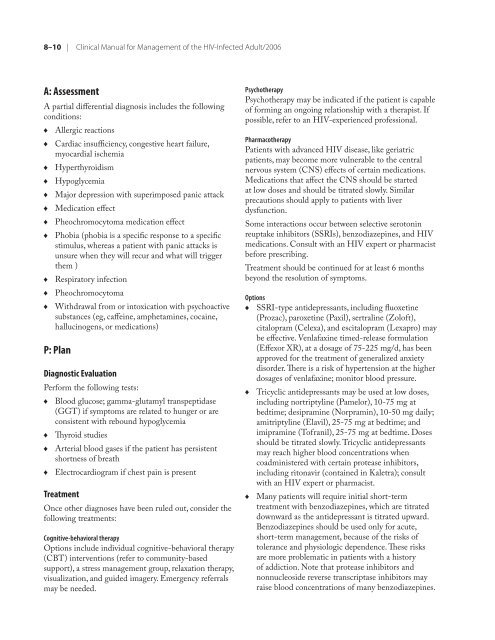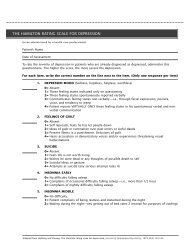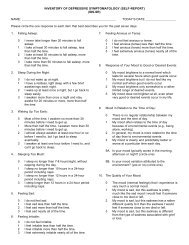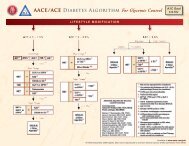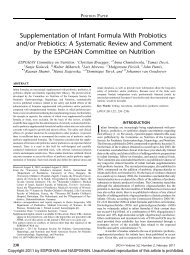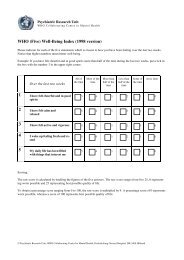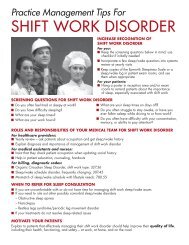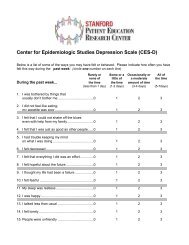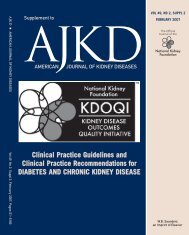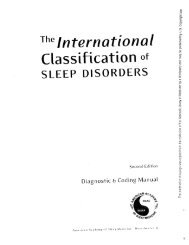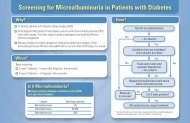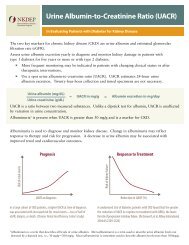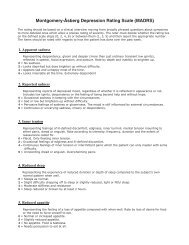Clinical Manual for Management of the HIV-Infected ... - myCME.com
Clinical Manual for Management of the HIV-Infected ... - myCME.com
Clinical Manual for Management of the HIV-Infected ... - myCME.com
Create successful ePaper yourself
Turn your PDF publications into a flip-book with our unique Google optimized e-Paper software.
8–10 | <strong>Clinical</strong> <strong>Manual</strong> <strong>for</strong> <strong>Management</strong> <strong>of</strong> <strong>the</strong> <strong>HIV</strong>-<strong>Infected</strong> Adult/2006<br />
A: Assessment<br />
A partial differential diagnosis includes <strong>the</strong> following<br />
conditions:<br />
♦<br />
♦<br />
♦<br />
♦<br />
♦<br />
♦<br />
♦<br />
♦<br />
♦<br />
♦<br />
♦<br />
Allergic reactions<br />
Cardiac insufficiency, congestive heart failure,<br />
myocardial ischemia<br />
Hyperthyroidism<br />
Hypoglycemia<br />
Major depression with superimposed panic attack<br />
Medication effect<br />
Pheochromocytoma medication effect<br />
Phobia (phobia is a specific response to a specific<br />
stimulus, whereas a patient with panic attacks is<br />
unsure when <strong>the</strong>y will recur and what will trigger<br />
<strong>the</strong>m )<br />
Respiratory infection<br />
Pheochromocytoma<br />
Withdrawal from or intoxication with psychoactive<br />
substances (eg, caffeine, amphetamines, cocaine,<br />
hallucinogens, or medications)<br />
P: Plan<br />
Diagnostic Evaluation<br />
Per<strong>for</strong>m <strong>the</strong> following tests:<br />
♦<br />
♦<br />
♦<br />
♦<br />
Blood glucose; gamma-glutamyl transpeptidase<br />
(GGT) if symptoms are related to hunger or are<br />
consistent with rebound hypoglycemia<br />
Thyroid studies<br />
Arterial blood gases if <strong>the</strong> patient has persistent<br />
shortness <strong>of</strong> breath<br />
Electrocardiogram if chest pain is present<br />
Treatment<br />
Once o<strong>the</strong>r diagnoses have been ruled out, consider <strong>the</strong><br />
following treatments:<br />
Cognitive-behavioral <strong>the</strong>rapy<br />
Options include individual cognitive-behavioral <strong>the</strong>rapy<br />
(CBT) interventions (refer to <strong>com</strong>munity-based<br />
support), a stress management group, relaxation <strong>the</strong>rapy,<br />
visualization, and guided imagery. Emergency referrals<br />
may be needed.<br />
Psycho<strong>the</strong>rapy<br />
Psycho<strong>the</strong>rapy may be indicated if <strong>the</strong> patient is capable<br />
<strong>of</strong> <strong>for</strong>ming an ongoing relationship with a <strong>the</strong>rapist. If<br />
possible, refer to an <strong>HIV</strong>-experienced pr<strong>of</strong>essional.<br />
Pharmaco<strong>the</strong>rapy<br />
Patients with advanced <strong>HIV</strong> disease, like geriatric<br />
patients, may be<strong>com</strong>e more vulnerable to <strong>the</strong> central<br />
nervous system (CNS) effects <strong>of</strong> certain medications.<br />
Medications that affect <strong>the</strong> CNS should be started<br />
at low doses and should be titrated slowly. Similar<br />
precautions should apply to patients with liver<br />
dysfunction.<br />
Some interactions occur between selective serotonin<br />
reuptake inhibitors (SSRIs), benzodiazepines, and <strong>HIV</strong><br />
medications. Consult with an <strong>HIV</strong> expert or pharmacist<br />
be<strong>for</strong>e prescribing.<br />
Treatment should be continued <strong>for</strong> at least 6 months<br />
beyond <strong>the</strong> resolution <strong>of</strong> symptoms.<br />
Options<br />
♦ SSRI-type antidepressants, including fluoxetine<br />
(Prozac), paroxetine (Paxil), sertraline (Zol<strong>of</strong>t),<br />
citalopram (Celexa), and escitalopram (Lexapro) may<br />
be effective. Venlafaxine timed-release <strong>for</strong>mulation<br />
(Effexor XR), at a dosage <strong>of</strong> 75-225 mg/d, has been<br />
approved <strong>for</strong> <strong>the</strong> treatment <strong>of</strong> generalized anxiety<br />
disorder. There is a risk <strong>of</strong> hypertension at <strong>the</strong> higher<br />
dosages <strong>of</strong> venlafaxine; monitor blood pressure.<br />
♦<br />
♦<br />
Tricyclic antidepressants may be used at low doses,<br />
including nortriptyline (Pamelor), 10-75 mg at<br />
bedtime; desipramine (Norpramin), 10-50 mg daily;<br />
amitriptyline (Elavil), 25-75 mg at bedtime; and<br />
imipramine (T<strong>of</strong>ranil), 25-75 mg at bedtime. Doses<br />
should be titrated slowly. Tricyclic antidepressants<br />
may reach higher blood concentrations when<br />
coadministered with certain protease inhibitors,<br />
including ritonavir (contained in Kaletra); consult<br />
with an <strong>HIV</strong> expert or pharmacist.<br />
Many patients will require initial short-term<br />
treatment with benzodiazepines, which are titrated<br />
downward as <strong>the</strong> antidepressant is titrated upward.<br />
Benzodiazepines should be used only <strong>for</strong> acute,<br />
short-term management, because <strong>of</strong> <strong>the</strong> risks <strong>of</strong><br />
tolerance and physiologic dependence. These risks<br />
are more problematic in patients with a history<br />
<strong>of</strong> addiction. Note that protease inhibitors and<br />
nonnucleoside reverse transcriptase inhibitors may<br />
raise blood concentrations <strong>of</strong> many benzodiazepines.


